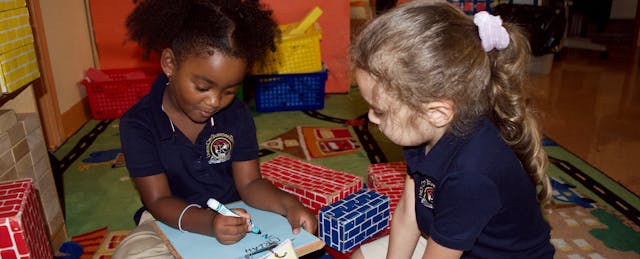UNION CITY, N.J. — With a roomful of rapidly developing children with wildly different needs in their care, early childhood educators will inevitably observe a host of behavioral and learning challenges among their students over the course of a school year. In any preschool classroom, some children may struggle to communicate, have a hard time making friends or experience separation anxiety from a parent. Others may struggle to learn new concepts, or exhibit aggressive tendencies.
That challenges will arise in a classroom is a given. How teachers address these challenges—and with what training and resources—is the variable.
Early childhood educators in Union City—one of the most densely populated cities in the United States, located just across the Hudson River from Manhattan—are better supported than most.
At Union City Public Schools, and at a couple dozen other districts in New Jersey, teachers are assigned specially trained coaches who offer instructional guidance and model interventions for developmental issues that arise, including physical, behavioral or linguistic challenges. The coaches carry out their roles across two discrete teams: a group of master teachers, who primarily address instructional needs, and the preschool intervention and referral team (PIRT), which supports teachers with behavioral challenges they face in the classroom.
Adriana Birne, director of Union City’s early childhood programs, likes to think of these coaches as “walking resources” for teachers. The coaches are all former early childhood teachers. Their goal is to help teachers better support students and families in the community.
Union City Public Schools is among the state’s 31 “Abbott districts,” referring to a series of state supreme court decisions in the 1980s and 1990s that required New Jersey to finance high-quality preschool to 3- and 4-year-olds in low-income, urban districts and set in place the process through which quality indicators were set.
As a result of the Abbott decisions, which charged the state with defining what a “quality” preschool looks like, classes are capped at 15 children and served by at least one teacher and one aide. The decisions also required that the state fund support staff for early childhood programs in Abbott districts, including master teachers and family workers. Perhaps the biggest change was an increase in credentialing, with lead teachers required to obtain a bachelor’s degree by 2004, which, in effect, elevated the status of early childhood educators in New Jersey.
Educators in Union City, and across the state, say that the Abbott decision changed the way their community views the role of early learning in children’s growth and development. Birne puts it this way: “It has raised an understanding of the importance of early education for people outside our world. In the past, they felt that day cares were just for playing.”
But the changes went beyond public perception. The Abbott districts boast salaries for pre-K lead teachers that independent researchers have found achieve “full parity” with K-3 teachers’ salaries. That’s a major development in a sector where just four states, including New Jersey, require pre-K starting salaries to be equivalent to K-3 teachers.
“Our workforce much more closely resembles K-12” than in most other places, Birne adds.
On the instructional side, all Abbott districts, including Union City, have master teachers on staff who offer guidance to educators, especially those who serve specialized populations, such as English language learners and children with Individualized Education Programs (IEPs).
The state provides at least one master teacher for every 20 preschool classrooms, and at least one per district, regardless of its size. Union City’s program includes 11 master teachers who oversee the district’s 135 preschool classrooms.
Master teachers are employed and trained by the New Jersey Department of Education. They attend 10 professional development workshops each year at the state department of education, where they learn about instructional best practices, new observational tools, and how to improve in their roles as mentors and coaches. Then they transfer that knowledge to teachers by leading their own professional development experiences throughout the year.
Master teachers also observe each classroom teacher under their supervision weekly. In special cases, such as with a new hire, master teachers may extend a visit to several days or a full week.
After an observation, a master teacher may offer direct feedback to the teacher and work with her to implement changes using the reflective cycle. Through reflection, teachers can adjust their practices to improve student outcomes, record progress related to those adjustments and make additional tweaks as needed.
Of the district’s 11 master teachers—all of whom gathered around a large table in Union City last fall to share their experiences with EdSurge—four have been in the role for more than 15 years, and one, Maria Valdivia, has been with the program since its first year of implementation, in 1998. Most of the others have invested at least 5 to 10 years in the role, after serving long careers as early childhood teachers.
This is not typical for early childhood educators. In most parts of the United States, retention is a problem for early childhood centers, with studies showing turnover rates of between 26 and 40 percent annually. But in Union City, it’s quite the opposite. Teachers have opportunities to advance their careers—not just from assistant to lead teacher, but well beyond that.
As part of their qualifications for serving specialized populations, 10 of Union City’s 11 master teachers are certified in teaching English as a second language (ESL), and a handful also have bilingual education certifications—reimbursed in part or in full by the district. District-wide, over 20 percent of students are English language learners, with the majority speaking Spanish as their primary language.

Many children are just beginning to acquire communications skills at ages 3 and 4, so regardless of their first language, they tend to pick up language and reasoning at the same pace, says Patricia Canonico, another master teacher. Plus, she notes, at that age, “play is an international language.”
The students’ burgeoning bilingual skills are quickly detectable during morning story time in Melissa O’Dell’s classroom in Union City. O’Dell, a lead teacher at the Eugenio Maria de Hostas Center for Early Childhood Education, reads a board book called “Cookie’s Week” to the kids, who eagerly participate from the rug.

O’Dell had read the same story every day that week, walking her students through Cookie the cat’s antics—knocking over plants, toppling trash cans, climbing curtains. But each time she had read it, she closed the book and said “the end” before describing his last day, Sunday.
The children, not to be outsmarted, notice what she’s doing and erupt in laughter and protest. All week, in an effort to keep the mystery going and the kids engaged, O’Dell has then asked the children to predict what Cookie does on Sunday. Today, she asks them again.
One guesses he’ll ride a scooter, another that he’ll chase a mouse, a third that he’ll take a bath. The day before, one student, Leah, answered that Cookie would go to his “cama”—Spanish for bed—but today she offers the same prediction in English. Noting the switch, O’Dell calls on her assistant teacher to explain to the class that both words mean the same thing, but in different languages.
For social and emotional support, teachers turn to the PIRT team, which, in Union City, is comprised of eight specially trained educators employed by the state education department.
Each PIRT member oversees 27 to 30 classroom teachers. Their goal is to help teachers address challenging behaviors by modeling helpful interventions and strategies.
“Any red flags that the teachers would see in the beginning of the year or anything that they deal with throughout the year, we'll go in and coach them on it,” says Kerri-Lyn Schaffner, one of the PIRT coaches. “We work one-on-one with the teachers.”
PIRT members act as a bridge between classroom teachers and related service providers who evaluate and support students. In addition to former preschool teachers, the PIRT team may include a school psychologist, behavioral specialist and social worker.
“It's pretty much like an open door policy,” Schaffner says of PIRT’s relationships with teachers. “They can call, they can email, they can do anything they want or need to reach us, and we do what we have to do.” For example, a teacher might contact her designated PIRT coach to discuss a 4-year-old student who is struggling to communicate in the classroom.
In such a case, the PIRT coach would arrange a time to observe the child in the classroom. Depending on what she gleaned from the visit, she might either make some suggestions to the teacher about strategies to try with the child, or she might begin a conversation with the teacher, family and speech therapist about evaluating the child for eligibility for speech and language services.
In between these on-demand visits, PIRT coaches regularly check in with each teacher in their cohort and stop by for occasional pre-scheduled classroom observations. The PIRT coach might attend the 20-minute morning meeting and offer adjustments during her debrief with the teacher. For example, she might suggest how the daily schedule can be shuffled to encourage student independence, or how to rearrange the furniture in the room to limit the open space children have to run. Or she may offer a song to use during the transition from the morning meeting to small groups to make it smoother. In each case, the PIRT coach would find time to meet with the teacher to discuss her recommended strategy, then might lead the next day’s morning meeting alongside the teacher, as a way of modeling the new approach for the teacher and the students.

When it’s not an issue that requires outside intervention, Schaffner says, “we work with the teacher to try different strategies. Some things work; some things don't work. We say, ‘You have to give it at least a week.’ If it doesn't work, we go on to the next thing.”
For minor behavioral challenges, teachers often create a designated “cozy corner” in the classroom, where children can go to calm down, using breathing techniques, books, sensory objects and other emotion-regulating tools. It “helps the child get frustration out,” Schaffner explains.
But one of the immense challenges of the PIRT team’s work is that the solutions are not one-size-fits-all.
“Every class is different,” Schaffner explains. “What works for one won't work for another, and what worked last year might not work this year. It's always an adjustment.”
Together, the master teachers and PIRT team have contributed to a shift in not only how students are educated and teachers are supported in Union City, but in how people think about preschool education more broadly, Birne notes.
“Now, preschool education has been recognized, and the number of professional development opportunities that are offered for all staff members has increased tremendously,” she says. “Our work is being respected and validated. And the research has proven that the program does work, and it does create a foundation for the children. And that's what we're all about.”


